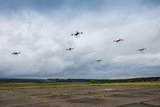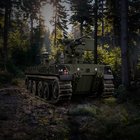Training and Logistics Support Activity for small UAS launched
The US Naval Air Systems Command has launched a new UAV training and logistics programme at at Camp Lejeune, NC, giving future UAV operators access to new and improved curriculum. The announcement was made in a 28 August 2012 statement.
A team from the US Navy and Marine Corps Small Tactical UAS programme office (PMA-263) launched the Training and Logistics Support Activity (TALSA) in mid-July to marines from II Marine Expeditionary Force. The activity allows troops to receive UAS training on short notice and expand the previous curriculum to include all Group I UAS assets.
Group 1 UAS assets are small UAS that typically weight less than 20 lbs, fly below 1,200 feet, and have a flight duration of 45 minutes to 2 hours. Examples include the RQ-11B Raven, Wasp, RQ-20A Puma and RQ-16B T-Hawk UAS.
Col. Jim Rector, PMA-263 programme manager, commented on the decision to include Group 1 assets, saying: ‘Consistent training and sustainment support are key components for any weapon system and are integral to the warfighter’s mission success. After years of operational contingency funding and rapid fielding of numerous small UAS, we identified this as an area that we needed to rapidly improve.’
According to Rector, small UAVs provide the battlefield commander an organic capability, within his or her unit, to perform over-the-horizon reconnaissance, surveillance and target acquisition. This reduces operational risks and enhances his or her decision process.
Until now, the marines used other contracts to support their UAS training requirements for the RQ-11B Raven. The newly established TALSA offers classes more frequently with an expanded curriculum, giving sailors and marines greater flexibility when going on rapid deployment.
The courses focus on the systems' function, employment, maintenance and troubleshooting issues. Once trained, UAS operators can tactically and effectively employ Group 1 systems to include mission planning, mission sensor/payload operations, launching, remotely piloting and recovering the aerial vehicle.
PMA-263 plans to establish an additional TALSA at Camp Pendleton later in 2012.
More from Uncrewed Vehicles
-
![Ready for the race: Air separation drone swarms vs. air defence systems]()
Ready for the race: Air separation drone swarms vs. air defence systems
As the dynamics of aerial combat rapidly evolve, Chinese scientists have engineered a sophisticated air separation drone model that can fragment into up to six drones, each capable of executing distinct battlefield roles and challenging the efficacy of current anti-drone defences such as the UK’s Dragonfire laser system.
-
![Israel’s MALE UAVs ‘must adapt’ to Iranian-made air defences]()
Israel’s MALE UAVs ‘must adapt’ to Iranian-made air defences
Advancements in air defence technologies have begun to reshape aerial combat dynamics in the Middle East, as illustrated by recent events involving the Israeli Air Force and Hezbollah.
-
![Hundreds more UAS sent to Ukraine forces with thousands more on the way]()
Hundreds more UAS sent to Ukraine forces with thousands more on the way
Both sides of the Russia-Ukraine war have been using UAS for effective low-cost attacks, as well as impactful web and social media footage. Thousands more have now been committed to Ukrainian forces.
-
![AI and software companies selected for US Army Robotic Combat Vehicle subsystems]()
AI and software companies selected for US Army Robotic Combat Vehicle subsystems
The US Army has intentions to develop light, medium and heavy variants of the Robotic Combat Vehicle (RCV) as part of the branche’s Next Generation Combat Vehicle family.
-
![DroneShield to improve software of DroneSentry-X C-UAS system under new contract]()
DroneShield to improve software of DroneSentry-X C-UAS system under new contract
DroneSentry-X, a cross-vehicle compatible, automated 360° C-UAS detect and defeat device, can offer 360° awareness and protection using integrated sensors. According to its manufacturer, it is suitable for mobile operations, on-site surveillance and on-the-move missions.
-
![Ukraine takes delivery of new indigenous C-UAS systems]()
Ukraine takes delivery of new indigenous C-UAS systems
Funded by the country’s former president, the new C-UAS systems will be sent to the frontline where they have already been tested against Russian invading forces.


























